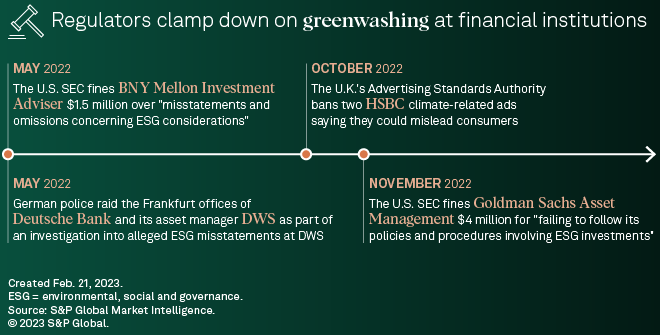

| In 2022, the U.K.’s advertising watchdog banned two HSBC ads for being misleading about its green credentials and not mentioning the bank’s financing of polluting industries. Source: JJ Gouin/iStock/Getty Images Plus via Getty Images |
A regulatory crackdown on greenwashing leaves banks vulnerable to probes and penalties over misrepresented sustainability statements.
European and U.S. regulators are expected to more aggressively scrutinize financial institutions’ environmental, social and governance claims as they introduce new disclosure and labeling rules, and ramp up enforcement. It comes amid mounting fears that firms are exaggerating their sustainability credentials to capitalize on surging demand for green investments.
“Greenwashing is definitely now high on the priority list for many regulators, so there’s going to be much more scrutiny,” David Thomas, a managing associate in Linklaters’ dispute resolution team, said in an interview.
Evident of this growing enforcement, regulators in both the U.S. and Europe took on some high-profile greenwashing cases and initiatives in 2022.
U.S. Securities and Exchange Commission last year fined BNY Mellon Corp. and Goldman Sachs Group Inc. $1.5 million and $4 million, respectively, over ESG misstatements and policy failures within their investment management units. This was the first time a regulator has fined financial institutions over ESG-related failings, which was “a clear message” to the investment world that the SEC will investigate greenwashing claims thoroughly, said Edel Brophy, global director of regulatory compliance at regtech firm Fenergo.
In Germany in May, police raided the Frankfurt offices of DWS Group and its majority shareholder Deutsche Bank AG, reportedly involving officials from the country’s financial watchdog BaFin, as part of investigations into allegations the asset manager misled clients about its sustainable investing. The U.K.’s Financial Conduct Authority in October proposed a new anti-greenwashing law and said it was enhancing its enforcement strategy, with investigations expected to follow.
“It’s only a matter of time before we start seeing some enforcement action from the European regulators as well,” said Thomas.
Nonfinancial regulators are also beefing up efforts to tackle greenwashing. The U.K.’s Advertising Standards Authority last year ruled to ban misleading climate-related ads by HSBC Holdings PLC, while Britain’s Competition and Markets Authority last month launched a review into green claims made by companies selling household essentials.
New and old regulation
The risk of regulatory probes into greenwashing allegations is “absolutely an emerging threat for all banks,” said Charles Crowne, a litigation lawyer at Osborne Clarke specializing in commercial and regulatory disputes. While banks risk financial penalties, the reputational harm of being investigated and prosecuted could be even more damaging, he said.
New or upcoming legislation across jurisdictions will further expand the legal framework against which regulators can take action. The EU’s Sustainable Finance Disclosure Regulation, or SFDR, has already introduced stricter disclosure requirements and criteria for investments classified as sustainable, essentially putting into law what financial firms can claim to be green. Similar regulation is underway in the U.K. and the U.S. The EU is also planning to introduce stricter rules for other products and services that companies wish to brand as sustainable, according to a document seen by Reuters.
“A couple of years ago, everyone was very keen to talk about green credentials and sell green investment products, but, really, the terms that were applied didn’t mean anything,” Crowne said. “You’re now moving towards a more mature market, where the data is getting better and the regulators are on top of it. Most regulators around the world are trying to be really clear on what certain labels mean.”
As with previous new financial regulation, fines are likely to follow one to two years after the rules have been fully implemented, said Brophy.

Regulators are meanwhile expected to use current frameworks. The SEC has been using existing powers “and just applying them in the greenwashing context,” said Menaka Nayar, a U.S.-based senior associate in Linklaters’ dispute resolution practice. She expects the SEC to press forward with more ESG-related investigations and fines this year.
In the U.K., the FCA’s new anti-greenwashing rule sends a “clear signal” that the regulator is adopting an interventionist approach to greenwashing, even though it simply reiterates previous obligations that communications should be clear and fair, Pinsent Masons attorneys said in a Nov. 3 note. The FCA may not wait until the rules are implemented in June 2023 to review or take enforcement action against suspected greenwashing, they said.
The regulator is likely to take on some “high-profile investigations” targeting the most egregious examples to show it is serious about combatting greenwashing, according to Osborne Clarke’s Crowne.
An FCA spokesperson would not comment on the authority’s enforcement plans, but said: “We have a range of tools to tackle greenwashing. We are already reviewing how firms are applying our guiding principles for the design, delivery and disclosure of sustainable funds, and will use our supervisory tools where we identify issues.” The SEC declined to comment.
Evolving expectations
Shareholders and activists are also likely to play a part. Often there will be a “feedback loop” whereby regulatory enforcement actions are followed by litigation by investors, or investor cases will trigger regulatory interest, said Nayar.
This is especially true in jurisdictions such as the U.K. and the U.S., where the market for litigation funding related to ESG claims is growing, as is the willingness amongst activists to go to court, Thomas said.
Under this intensifying scrutiny, financial institutions face a substantial challenge to ensure their sustainability statements line up with changing regulatory expectations.
“It’s not always easy to get it right,” said Thomas. “Staying on top of the evolving regulatory landscape across and even within jurisdictions is a challenge.”
For large and global institutions, it will be especially difficult to control what is being said publicly on sustainability across their business, Thomas said. Banks will also face practical challenges in sourcing and verifying ESG data they base their sustainability claims on, he said.
European asset managers have already reclassified hundreds of investment funds to less stringent ESG categories since the EU’s SFDR rules came into effect in 2021. In the fourth quarter of 2022 alone, 307 funds representing €170 billion in assets under management were downgraded from Article 9, a category for products with sustainable investment as an objective, to Article 8, which promotes environmental or social characteristics, according to Morningstar data.
A BNY Mellon spokesperson said its investment adviser business has updated its materials for six of its funds to ensure its communications to investors “are precise and complete” in the wake of the resolution with the SEC.
A DWS spokesperson said the asset management industry should have “great sensitivity” when it comes to communication around sustainability. “We constantly adapt our processes to follow the changes in the regulatory framework as well as to include new findings in the identification and processing of ESG data,” it said.





